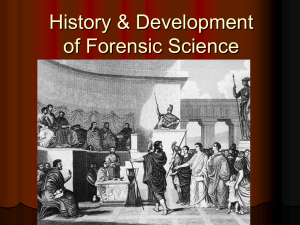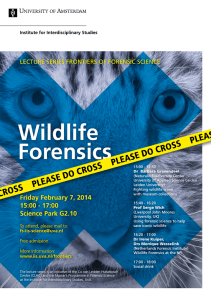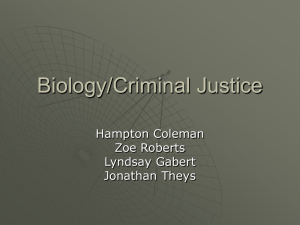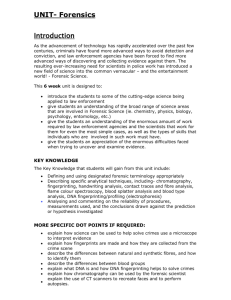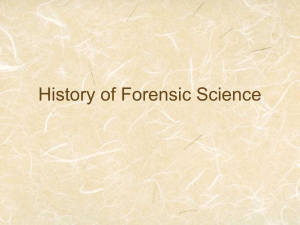Forensics Science Certificate - University of Wisconsin Whitewater
advertisement
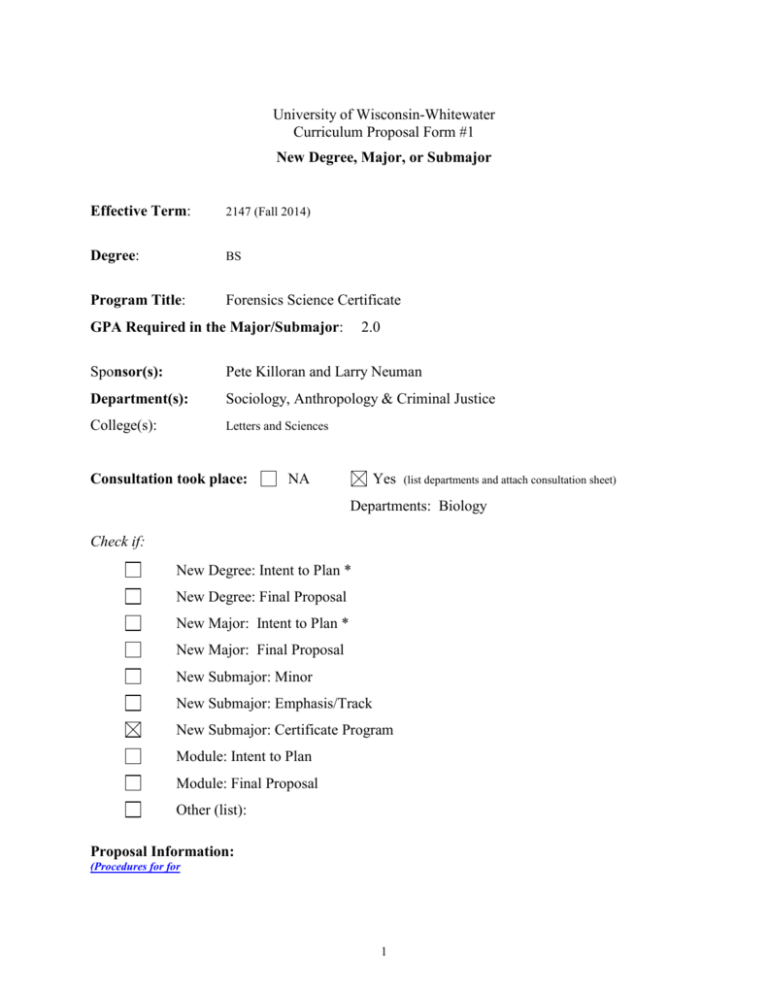
University of Wisconsin-Whitewater Curriculum Proposal Form #1 New Degree, Major, or Submajor Effective Term: 2147 (Fall 2014) Degree: BS Program Title: Forensics Science Certificate GPA Required in the Major/Submajor: 2.0 Sponsor(s): Pete Killoran and Larry Neuman Department(s): Sociology, Anthropology & Criminal Justice College(s): Letters and Sciences Consultation took place: NA Yes (list departments and attach consultation sheet) Departments: Biology Check if: New Degree: Intent to Plan * New Degree: Final Proposal New Major: Intent to Plan * New Major: Final Proposal New Submajor: Minor New Submajor: Emphasis/Track New Submajor: Certificate Program Module: Intent to Plan Module: Final Proposal Other (list): Proposal Information: (Procedures for for 1 m #1) * Note: You must receive approval from System to plan a new Degree or Major (submajors not included) For System requirements see ACIS-1guidelines at http://www.uwsa.edu/acadaff/acis/index.htm Catalog description of the program The Forensic Science Certificate emphasizes the application of science to criminal law. Students pursuing the certificate integrate criminal investigation techniques, concepts from jurisprudence, and natural science methodology. The certificate provides a basic foundation for students interested in careers in crime investigation or in crime labs. Student Learning Objectives Students should know and be able to do upon completing the program include the following: A. Students will develop skills necessary for a “Forensic Mindset” by completing a survey of the forensic sciences and appropriate lab practicums and following a crime investigation from beginning to end. B. Students will be able to identify evidence, know the correct procedure for collecting it, and know how to properly document it while maintaining chain of custody. C. Students will demonstrate an understanding the importance of ethics in courtroom testimony and professional practice. D. Students will investigate different types of crime scenes, including death investigations, and then develop hypotheses and present the material in class or in mock trials. E. Each student will conduct an experiment on a topic in forensics and do oral and written reports on the topic. F. Students will demonstrate an understanding of the training and ongoing education required to maintain professional status in the field of Forensics. List of courses to be included in the program Required Core Courses (12 CREDITS) BIOLOGY 225 Science of Forensic Analysis CRIMJUS 325 Forensics Documentation CRIMJUS 425 Advanced Forensic Anthropology CRIMJUS 321 Criminal Investigation Elective Courses (3 UNITS) Select one of the Following: CRIMJUS 329 Investigation of Death CRIMJUS 322 Criminal Investigation of Child Abuse Required Capstone (3 UNITS) Select one of the Following: CRIMJUS 493 Internship in Criminal Justice CRIMJUS 498R Undergraduate Research in Criminal Justice 2 COURSES 4 Required Courses BIO 225 Science of Forensic Analysis CRIMJUS 321 Criminal Investigation CRIM JUS/ANTHROPOL 325 Forensic Documentation CRIMJUS/ANTHRO 425 Advanced Forensic Anthropology Course from the following: CRIMJUS 322 Criminal Investigation of Child Abuse CRIMJUS 329 Investigation of Death Required Capstone, one of the following: CRIMJUS 493 Internship in Criminal Justice CRIMJUS 498R Undergraduate Research in Criminal Justice Learning Objectives A B C D E F X X X X X X X X X X X X X X X X X X X X X X X X X X X X A 4-year plan of course offerings COURSE BIOLOGY 225 CRIMJUS 321 CRIMJUS 325 CRIMJUS 425 ELECTIVES CRIMJUS 322 CRIMJUS 329 CAPSTONE CRIMJUS 493 CRIMJUS 498R Fall X X Sprg Sum X X Fall X X X Sprg Sum X X Fall X X X Sprg Sum X X Fall X X X Sprg Sum X X X X X X X X X X X X X X X X X X X X X X X X X X X X X X X X X X X X X X X X X List of the required courses in a format appropriate for the catalog and advising report 18 CREDITS 1. BIOLOGY 225 2. CRIMJUS 321 3. CRIMJUS 325 4. CRIMJUS 425 5. CRIMJUS 322 or CRIMJUS 329* 6. CRIMJUS 493 or CRIMJUS 498R UNIQUE REQUIREMENT CHEMISTRY 100 or CHEMISTRY 102 AND BIOLOGY 120 or BIOLOGY 141 ------------------------------------------------------------------------------------------------FOR COMPARISON ONLY, CURRENT FORENSICS SCIENCE MINOR -------------------------------------------------------------------------------------------------MINOR - 21-22 UNITS 1. BIOLOGY 225 2. CRIMJUS 321 3. CRIMJUS 325 4. SOCIOLGY 374 3 5. CRIMJUS 425 6. SELECT 5-6 UNITS FROM: CRIMJUS 322, CRIMJUS 329, CRIMJUS 494, SOCIOLGY 371, SOCIOLGY 373 An assessment plan for the program (to be submitted after program approval to the University Assessment Committee for review; not required if program assessment will be integrated into an existing departmental assessment plan for the Criminology Major/Minor). In addition, assessment will include feedback from the Advisory Board in Criminology (being formed). A panel of faculty will review a 50% sample capstone projects and internship reports conducted every other year. Resources needed to support the program (staffing, equipment, library materials, etc.) Need space to store equipment and laboratory instructional space. Approximately $500 per year is being spent for supplies in CRIMJUS 325 and 425 (includes fingerprint kits, footprint powder, photo developing, chemicals, and drug test kits used in classroom instruction) and approximately $250 pers year for BIOLOGY 225 supplies. A stipend of $1500 is needed for police officer to assist in teaching the summer course on Investigation of Death. Student need/demand for the program The student demand in the current Forensics Science Minor that will be converted to the Certificate between 2011 and 2013 has remained stable at 28-33 students. The Certificate has three advantages over the Forensics Science Minor that will be removed from the curriculum. First, it narrows the focus to forensics criminal investigation-analysis with a natural science foundation. Second, emphasizes a practical “hands-on” involvement of working in a disciplined manner with evidence, materials, and documentation. Third, more students may be able to complete the Certificate, since courses in it and can also count in a student’s Major or Minor. Forensic scientists work in crime labs — local, regional, and national — and in paternity identification labs. Students of anthropology can use their skills as a forensic scientist to conduct investigations at archeological sites. Relation of the program to other programs on campus, in the UW System, and in the region There are only two programs in Forensics in Wisconsin, UW-Milwaukee has a 21 credit Forensics Science Certificate program with 8 credits of unique requirements and UW-Platteville has a Forensic Investigation major. 4


